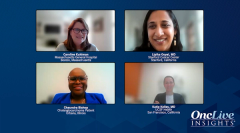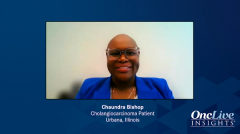
First- and Second-Line Treatment Options for Intrahepatic Cholangiocarcinoma With FGFR2 Fusions or Alterations
Experts discuss treatment options for cholangiocarinoma and how FGFR inhibitors have changed the treatment landscape in recent years.
Episodes in this series

This page is funded by Taiho Oncology, Inc. The faculty and publisher are solely responsible for this content. Taiho does not recommend or endorse the use of its products other than as described in the approved labeling. The content of this page is not medical advice and does not replace independent medical judgment.
This is a video synopsis/summary of a OncLive Insights involving Lipika Goyal, MD; Chaundra Bishop; R. Katie Kelley, MD; and Caroline Kuhlman, NP.
Kelley stated first-line treatment for advanced cholangiocarcinoma is chemotherapy (gemcitabine/cisplatin) plus immunotherapy (durvalumab/pembrolizumab), regardless of mutation status, based on improved survival over chemotherapy alone. Challenges launching frontline FGFR inhibitor trials have prevented clear data on superiority over chemoimmunotherapy. Thus, chemoimmunotherapy remains standard for now. If patients have chemotherapy contraindications, Kelley would consider off-label FGFR blockade upfront.
For FGFR2-altered cholangiocarcinoma progressing after first-line therapy, Goyal discussed FDA-approved FGFR inhibitors pemigatinib and futibatinib. The pemigatinib trial reported a 35.5% response rate and 7-month progression-free survival in previously treated patients. Since historical second-line chemotherapy response rates are only 5%, this efficacy is encouraging. Futibatinib demonstrated a 42% response rate and 9 months progression-free survival. Both drugs showed favorable safety profiles.
In summary, first-line chemoimmunotherapy remains standard for advanced cholangiocarcinoma. However, 2 FGFR inhibitors have now shown marked efficacy vs historical treatments. Further trials explore these agents in additional lines of therapy and combination regimens.
Video synopsis is AI-generated and reviewed by OncLive® editorial staff.





































